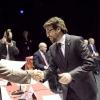At the Land Portal, we are always trying to align with other open initiatives, and Wikidata is one of them. Wikidata was created as a central collaboratively edited knowledge base, adding semantics to the pieces that conforms it so computers can understand the relationships between these pieces. This solution is addressing the issue of updating/creating the same knowledge in different language’s wikipedias, where you had to go one by one in order to edit and change it.
This project, under the Wikimedia Foundation umbrella, is growing fast and we wanted to learn more about it and find a way to collaborate. Ideally, we are planning to map LandVoc to Wikidata. Is that feasible? What are the steps? What are the resources needed?
In order to address these pressing issues, I had the privilege of representing the Land Portal Foundation at the “Wikidata and Wikibase Workshop: developing a Wikibase instance”, which took place at the University of Ghent (Belgium) from the 3-5 July 2019.
The content of the workshop was given by Micelio, with the support of the Ghent Centre for Digital Humanities, WeChangEd ERC project, Wikimedia Deutschland, Science Stories, and the IDLab.
During these three days, we acquired a lot of new knowledge about the Wikibase and Wikidata and how to make data come alive through the use of these wikimedia projects.
During the first day, speakers gave an overview of Wikidata, Wikibase and Linked Open Data (LOD). In addition, a couple of exciting projects focused on reusing LOD were presented, such as Science Stories by Kat Thornton and the ShapeArchitect tool from Iovka Boneva & Jérémie Dussart. Afterwards, all the teams selected for this workshop expounded upon their ideas with the entire audience.
Tom Baker (FAO) and myself constituted the team “LandVoc”. Our aim was to include in a wikibase instance the small set of concepts of LandVoc, which is part of Agrovoc, a controlled vocabulary covering 36,000 terms related to agriculture and nutrition. We want to explore the issues involved in mirroring this external concept scheme, integrating its own Universal Resource Identifiers (URIs) into a Wikibase instance and Wikidata.
We began discussing the idea of mapping LandVoc against Wikidata one year ago, when Andra Waagmeester from Micelio explained the Wikidata project and its possible implications. From the perspective of the Land Portal, we saw the potential of accessing content from wikipedia tagged with LandVoc, and also the prospect of piloting LandVoc beyond the land community and targeting a more general audience.
The following 2 days were a mix of hands-on sessions in order to achieve this goal, combined with presentations for taking the necessary steps, which included setting up a wikibase instance using docker, modelling our knowledge for fitting it into wikibase, prepare a pruned down version of LandVoc with only labels in English and URIs and finally populating our wikibase instance with this lean version of LandVoc.After this process was complete, the Wikibase instance was successfully populated.
Yet, there is one additional step to explore how to combine this Wikibase instance with Wikidata. We evaluated various scenarios for mapping LandVoc in Wikidata, like reusing a wikibase instance, asking the community for the mapping process and mapping directly from LandVoc to Wikidata using software technologies.
The code developed during the workshop as well as the presentations are available on GitHub under an Open License.
This workshop gave us a better technical understanding of Wikidata project, a project with more than 57 million concepts, more than 21,000 contributors and more contributions than the English Wikipedia. These huge numbers are a reminder that we need to follow closely the Wikidata project.
I am grateful for the opportunity to participate in this event, and offer a special thanks to field organizers and my team mate Tom Baker. We are eager to keep learning and sharing our knowledge on this topic!


